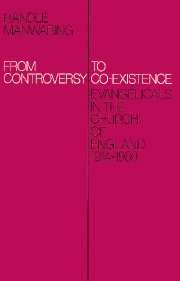Book contents
- Frontmatter
- Contents
- Acknowledgements
- Preface
- 1 Into battle
- 2 The defensive years
- 3 Through the Waste Land
- 4 Continuing nadir
- 5 The turning tide
- 6 Towards the conversion of many
- 7 Flood-tide of Evangelism
- 8 Anatomy of Evangelicalism
- 9 The Fundamentalist issue
- 10 The hard facts of Evangelicals and unity
- 11 The Honest to God debate
- 12 Liturgical debates
- 13 Charismatic differences
- 14 Keele – a watershed
- 15 Evangelical identity – a problem
- Notes
- Index
2 - The defensive years
Published online by Cambridge University Press: 18 September 2009
- Frontmatter
- Contents
- Acknowledgements
- Preface
- 1 Into battle
- 2 The defensive years
- 3 Through the Waste Land
- 4 Continuing nadir
- 5 The turning tide
- 6 Towards the conversion of many
- 7 Flood-tide of Evangelism
- 8 Anatomy of Evangelicalism
- 9 The Fundamentalist issue
- 10 The hard facts of Evangelicals and unity
- 11 The Honest to God debate
- 12 Liturgical debates
- 13 Charismatic differences
- 14 Keele – a watershed
- 15 Evangelical identity – a problem
- Notes
- Index
Summary
After the slaughter of a world war, Britain, eventually and substantially, placed her faith in the League of Nations and ‘no more war’. This kindled a special brand of liberalism and humanism and many Christians, modernist and conservative, Catholic and Protestant, were hopeful that we would be able to pick up the pieces and rebuild a decent way of life in church and society. However, Evangelicals realised, better than most, that there would always be ‘wars and rumours of wars’ until the second Advent. In fact, as the years went by, suspicion, in thinking men and women, of recurrent failure hardened into a conviction that, despite political artefacts and the best will in the world, there was a persistent maggot in the human apple.
How, then, did Evangelicals respond to the heady days of optimism, recovery and resettlement? Within their own circumscribed church communities, they continued to preach the saving grace of God, appropriated by personal faith in the Lord Jesus Christ; they conceived the means of grace much more in terms of the weekly bible study and prayer meeting than in the sacrament of Holy Communion and they eschewed, on the whole, anything like real social concern and involvement. A good number of young men, evangelical and otherwise, hardened by life on the western front, went to theological college and, meanwhile, the faithful sought earnestly to guard the flame of biblical inspiration and the guiding light of the Thirty-nine Articles.
- Type
- Chapter
- Information
- From Controversy to Co-ExistenceEvangelicals in the Church of England 1914–1980, pp. 17 - 29Publisher: Cambridge University PressPrint publication year: 1985



